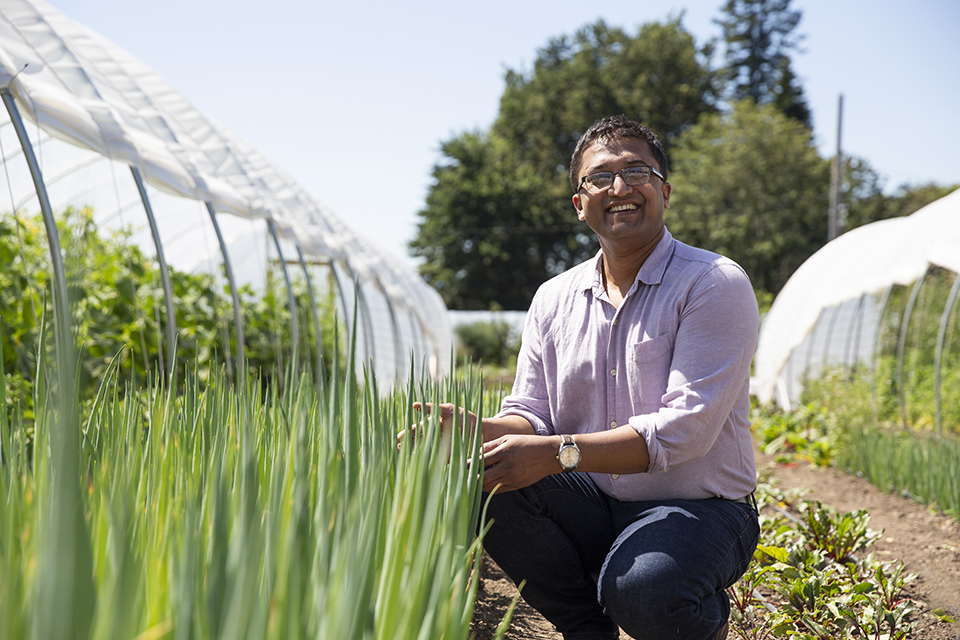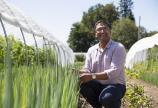Business reboot
Peter B. Gustavson School of Business
- Sasha Milam

Integrating ecological knowledge for sustainable business practices
When Saeed Rahman set out to understand how businesses can advance sustainability efforts through better integration of ecological knowledge, he turned first to farmers. What he found was that most agricultural organizations were using a different sustainability lexicon than businesses in other industries.
Rahman, who recently defended his PhD at the University of Victoria’s Sardul S. Gill Graduate School of Business, engaged farmers on the topic of sustainability and clearly remembers one response. “This person said: ‘I don’t believe in sustainability. Sustainability is the idea that we can keep taking at the rate that we’ve always been taking. Sustainability is over. Now, the new economy is about the regeneration economy,’” he recalls.
Rahman had assumed ecological knowledge— a cumulative body of knowledge about an organization’s interrelationships with nature— might be a new concept for business. He was surprised and fascinated to find many agricultural businesses had already reframed their ideas away from sustainability and towards regeneration as a necessary shift to protect the ecosystem and the longevity of their businesses. It became a key theme among his findings.
After dozens of interviews with BC-based organic and fair-trade organizations, Rahman identified common trends among success cases of these sustainably-minded businesses. His 10-dimension process model—a recipe of what worked for some businesses as they sought to become more sustainable—maps how ecological knowledge can be accessed, co-created and integrated into existing business strategy. The model starts with a business being willing to look beyond traditional organizational boundaries and see itself as embedded in the whole ecosystem. Timing is also a factor.
“When you look at most traditional business models, they are focused on fast, short-term output. The knowledge they require to produce short-term results has to be accessible to them quickly. Ecological knowledge does not come quickly.”
It can be hard to know how to start this shift. Rahman says one way is by forming cross-sector relationships with community stakeholders— such as scientists, conservationists, Indigenous Peoples, the general public and government agencies— in a collaborative, mutual-learning process about their shared ecological system. These relationships can end up ultimately protecting (and even strengthening) the social-ecological systems in which a business is embedded.
“Be open-minded about where your organization’s boundaries actually are. Keep in mind that it sometimes takes many years to create real change. And consult unconventional experts,” he says. “This will look different for each business.”
The factor that emerged from Rahman’s study which might prove the most difficult for some industries, however, is the concept of “unlearning.”
“I noticed an ongoing feedback loop of unlearning and re-defining the existing way of doing things—whether that's about what kind of knowledge is important, where to look for this knowledge, or how long it should take to see it reflected in a business’ bottom line. To make room for new ways, you have to unlearn the old ways. And that is an organizational challenge all its own,” he says.
Monika Winn, Rahman’s PhD supervisor, described the research as noteworthy because it enables organizations to build this knowledge into socially and economically sustainable business models.
Rahman’s research was supported by the Pacific Institute for Climate Solutions, Social Sciences and Humanities Research Council of Canada, and the Dr. Ian Stuart Memorial PhD Award.
EdgeWise
Rahman’s research was first inspired by a 2016 case study of Italian pasta manufacturer Barilla, co-authored by Rahman’s supervisor Winn and Stefano Pogutz. The study demonstrated how the company's efforts to help the farmers producing raw materials transition to more sustainable farming methods had far-reaching effects within the company and community. Examples include increased production yields, reduced environmental impact and economic, social and ecological benefits for farmers, the community and the organization.
Understanding and standardizing operations in multiple ecosystems means ecological knowledge might look different for multinational enterprises than it does for smaller companies like those in Rahman’s study, but don’t count large corporations out.
As the Barilla study demonstrated, motivations for improved sustainability go beyond an altruistic nod to future generations. Rahman identifies several multi-national corporations, such as Barilla and Patagonia, which have actively helped define ecological knowledge. Benefits to an organization include improved innovation, financial performance and reputation, as well as protecting the supply of natural capital.
When it came to designing his own ecological knowledge study, Rahman focused on small agricultural businesses in part because there were more of them integrating this knowledge, and therefore more available data.
“While all businesses ultimately require a functioning ecosystem in order to succeed, the link between environmental sustainability and business viabilit y is a lot shorter when you’re producing vegetables versus laptops,” he says.

